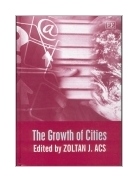‘Contemporary cities are of at least two kinds: those that are vibrant and
growing and those that are lagging. While this is nothing new the reasons are, at least in
part, different than in past generations. This book is a collection of "modern
classics" about the forces of growth in the late 20th and early 21st Century in
general and more specifically in agglomerated concentrations including cities. Human
capital, agglomeration, knowledge spread or spillovers, industrial clusters, concentration
of creative people, and global competition driven by a huge expansion of low cost labor
and explosive innovation all play a role. The book provides most of the best material that
has been published on these topics and their role in city growth and decline. It is a
collection all students of the city and growth should have in their personal library.’
Roger Stough, George Mason University, US
To understand why some regions grow and others stagnate, we need to understand the
interactions between economic growth, economic geography and the economics of innovation.
Each of these individual approaches has strengths and weaknesses, but when integrated it
is possible, as evidenced by this volume, to develop an appropriate model of
technology-led regional economic development.
27 articles, dating from 1962 to 2004 Contributors include: K. Arrow, D. Audretsch,
W.J. Baumol, E.L. Glaeser, A.B. Jaffe, P. Krugman, P. Nijkamp, P.M. Romer, J.A.
Scheinkman, A. Shleifer
Table of Contents:
Acknowledgements
Introduction Zoltan J. Acs
PART I ANALYTICAL OVERVIEW
1. Edward L. Glaeser (2000), ‘The New Economics of Urban and Regional Growth’
2. Peter Nijkamp and Jacques Poot (1998), ‘Spatial Perspectives on New Theories of
Economic Growth’
PART II NEW ECONOMIC GEOGRAPHY
3. Paul Krugman (1991), ‘Increasing Returns and Economic Geography’
4. Paul Krugman (1993), ‘First Nature, Second Nature, and Metropolitan Location’
5. Paul Krugman (1996), ‘Urban Concentration: The Role of Increasing Returns and
Transport Costs’
PART III NEW GROWTH THEORY
6. Paul M. Romer (1986), ‘Increasing Returns and Long-Run Growth’
7. Paul M. Romer (1990), ‘Endogenous Technological Change’
8. Robert E. Lucas, Jr. (1988), ‘On the Mechanics of Economic Development’
PART IV KNOWLEDGE SPILLOVER IN CITIES
9. Adam B. Jaffe, Manuel Trajtenberg and Rebecca Henderson (1993), ‘Geographic
Localization of Knowledge Spillovers as Evidenced by Patent Citations’
10. David B. Audretsch and Maryann P. Feldman (1996), ‘R&D Spillovers and the
Geography of Innovation and Production’
11. Luc Anselin, Attila Varga and Zoltan Acs (1997), ‘Local Geographic Spillovers
between University Research and High Technology Innovations’
PART V HUMAN CAPITAL AND THE GROWTH OF CITIES
12. Curtis J. Simon and Clark Nardinelli (1996), ‘The Talk of the Town: Human
Capital, Information, and the Growth of English Cities, 1861 to 1961’
13. Edward L. Glaeser, José A. Scheinkman and Andrei Shleifer (1995), ‘Economic Growth
in a Cross-Section of Cities’
14. James E. Rauch (1993), ‘Productivity Gains from Geographic Concentration of Human
Capital: Evidence from the Cities’
15. Antonio Ciccone and Robert E. Hall (1996), ‘Productivity and the Density of Economic
Activity’
PART VI DIVERSITY VS SPECIALIZATION IN CITIES
16. Edward L. Glaeser, Hedi D. Kallal, José A. Scheinkman and Andrei Shleifer
(1992), ‘Growth in Cities’
17. Vernon Henderson, Ari Kuncoro and Matt Turner (1995), ‘Industrial Development in
Cities’
18. Maryann P. Feldman and David B. Audretsch (1999), ‘Innovation in Cities:
Science-based Diversity, Specialization and Localized Competition’
PART VII ENTREPRENEURSHIP AND GROWTH OF CITIES
19. Claudio Michelacci (2003), ‘Low Returns in Rand D due to the Lack of
Entrepreneurial Skills’
20. Zoltan J. Acs and Catherine Armington (2004), ‘The Impact of Geographic Differences
in Human Capital on Service Firm Formation Rates’
21. Sam Youl Lee, Richard Florida and Zoltan J. Acs (2004), ‘Creativity and
Entrepreneurship: A Regional Analysis of New Firm Formation’
PART VIII CLUSTERS AND THE GROWTH OF CITIES
22. Timothy Bresnahan, Alfonso Gambardella and AnnaLee Saxenian (2001), Old
Economy Inputs for New Economy Outcomes: Cluster Formation in the New Silicon
Valleys’
23. Philip Cooke (2002), ‘Biotechnology Clusters as Regional, Sectoral Innovation
Systems’
24. Claus Steinle and Holger Schiele (2002), ‘When do Industries Cluster? A Proposal on
How to Assess an Industry’s Propensity to Concentrate at a Single Region or Nation’
PART IX COMPETITION AND PUBLIC POLICY
25. Kenneth J. Arrow (1962), ‘Economic Welfare and the Allocation of Resources
For Invention’
26. Michael E. Porter (1998), ‘Clusters and the New Economics of Competition’
27. William J. Baumol (2004), ‘Entrepreneurial Enterprises, Large Established Firms and
Other Components of the Free-Market Growth Machine’
Name Index
Hardcover
649 pages
Księgarnia nie działa. Nie odpowiadamy na pytania i nie realizujemy zamówien. Do odwolania !.


